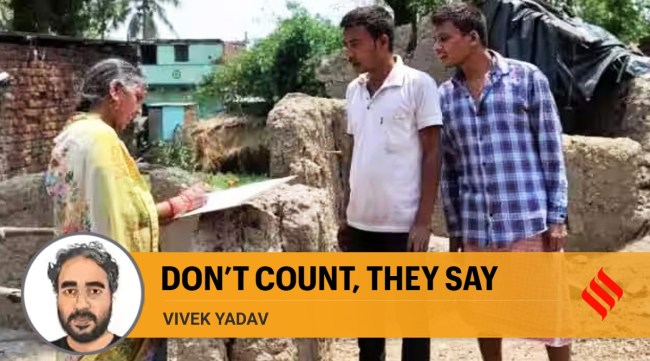Opinion To liberals against a caste census — India deserves better
The efficacy and desirability of reservation can be debated. But this move so typical of the critics of the politics of social justice — of reducing it to merely a demand for reservation — is disingenuous
 The idea that the state simply inscribes identities onto its citizens elides the element of self-identification.
The idea that the state simply inscribes identities onto its citizens elides the element of self-identification. The publication of the caste survey data by the Bihar government has, for the first time in nearly a century, furnished us with a reliable snapshot of the caste makeup of our society. Even as the implications of this move remain unclear, speculation is rife about the political fallout of the numbers.
Some supporters of the move predict that the information has the potential for causing a political earthquake. Critics have, in the meanwhile, raised an alarm. The BJP’s fear is quite understandable: It is afraid that the numbers, if they become public knowledge, might rip apart the winning caste coalition that it has so carefully stitched together. More puzzling, however, is the fear that seems to have gripped a section of the liberal commentariat. Don’t count, they say. For, social justice is a mirage that will lead our politics astray. And besides, what does counting castes have to do with addressing injustice in society? Don’t publish, they plead. The genie that will emerge out of the bottle, along with the numbers, will be impossible to put back in.
The liberals’ opposition to the publication of the caste survey data is baffling. The policy of keeping information from the public has, after all, long been regarded by liberals everywhere as one of the principal sources of tyranny.
What, then, should we make of the Indian liberals’ fear of the caste census data? Perhaps if we could better know the demons that haunt our liberal friends, we might be able to exorcise them. We might persuade them to shed their suspicion of the politics of social justice. Then, perhaps, India might get what it deserves — an Indian liberalism that is more awake to the possibilities of the present historical moment.
If there is a ghost that has all critics of the politics of social justice spooked, it is that of reservation. The only reason why anyone would want to know the caste census data, they reason, is to put in place a system of reservation. And the latter, they argue, is a most ineffective tool, if not also positively harmful.
Now, the efficacy and desirability of reservation can be debated. But this move so typical of the critics of the politics of social justice — of reducing it to merely a demand for reservation — is disingenuous. Surely, reservation is only one instrument wielded by the politics of social justice, which is in fact animated by a more general sentiment, a desire for greater equality in social conditions than currently exists. To this essentially democratic sentiment, which lies at the heart of the politics of social justice, the critics appear to be curiously deaf.
If anything, they ought to be the most enthusiastic supporters of a caste census. For, nothing could better fortify their argument, that no caste inequalities exist, than hard reliable data. But this is not what the critics really want. By criticising the instrument — reservation — they seek to deny the larger problem — caste inequality. Could it be that their real fear is that the caste census data shall unveil the privilege of the privileged?
Then there is the phantom of caste politics, the worry that publication of the results of the caste census shall lead our already caste-afflicted politics to become even more caste-ridden.
The plausibility of this argument may be judged from the fact that not collecting data on caste for 90 years has neither prevented politics from taking place on caste lines, nor caste from being politicised. Democratic politics everywhere in the world feeds off social divisions, and whether we like it or not, caste remains one of the major axes of social division in India today. Not counting castes will not change this fact. All it will do is ensure that politics moves in the dark.
However, the critics also have a deeper anxiety. Releasing the census data would have the effect of officially recognising caste groups, which in turn shall further consolidate caste identities. The source of this widely shared fear is a hypothesis popularised by certain historians of colonial India, who have argued that the colonial census transformed what was until then a fluid and shifting order of jatis, into an iron-clad hierarchy of official castes.
Without denying the power of the state to shape citizens’ identities, it is possible to question the rather simplistic understanding of identity upon which this unproven hypothesis rests. The idea that the state simply inscribes identities onto its citizens elides the element of self-identification, which is a crucial part of the concept of identity. The fact is that individuals exercise at least some agency in choosing their identities.
But perhaps the most terrifying of all spectres is that of caste majoritarianism. This fear, too, is not entirely unfounded. In the past, certain political parties in UP and Bihar have, in the name of social justice, simply replaced the rule of the upper castes with an equally tyrannical rule of the subaltern castes, and in the process given the politics of social justice a bad name.
But this is no reason to believe that caste majoritarianism is the only form that the politics of social justice could possibly take in the future. There is no reason to suppose that a politics seeking to address caste injustice cannot also subscribe to a set of robust liberal values. The champions of social justice can, and must, learn from their liberal critics and develop an outlook more fastidious with regard to individual rights. They must not allow the democratic sentiment for equality to become a depraved passion for brute majoritarianism.
Must we in India condemn ourselves to replaying the same fractious ideological battles that have drained the political energies of liberals and the practitioners of identity politics in Europe and the US? There is certainly no law of history that prevents us from forging our own unique version of liberalism in India, one that does not look upon the social justice agenda with suspicion, but which joins cause with it. India deserves a better liberalism, one that does not rebuke the politics of social justice, but which instead embraces it as an ally.
The writer teaches Political Theory at Ashoka University



